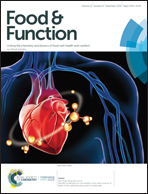The effects of resveratrol on metabolic status in patients with type 2 diabetes mellitus and coronary heart disease†
Abstract
This study was performed to investigate the effects of resveratrol on metabolic status in patients with type 2 diabetes mellitus (T2DM) and coronary heart disease (CHD). This randomized, double-blind, placebo-controlled trial was performed with 56 patients having T2DM and CHD. The patients were randomly divided into two groups to receive either 500 mg resveratrol per day (n = 28) or placebo (n = 28) for 4 weeks. Resveratrol reduced fasting glucose (β −10.04 mg dL−1; 95% CI, −18.23, −1.86; P = 0.01), insulin (β −1.09 μIU mL−1; 95% CI, −1.93, −0.24; P = 0.01) and insulin resistance (β −0.48; 95% CI, −0.76, −0.21; P = 0.001) and significantly increased insulin sensitivity (β 0.006; 95% CI, 0.001, 0.01; P = 0.02) when compared with the placebo. Resveratrol also significantly increased HDL-cholesterol levels (β 3.38 mg dL−1; 95% CI, 1.72, 5.05; P < 0.001) and significantly decreased the total-/HDL-cholesterol ratio (β −0.36; 95% CI, −0.59, −0.13; P = 0.002) when compared with the placebo. Additionally, resveratrol caused a significant increase in total antioxidant capacity (TAC) (β 58.88 mmol L−1; 95% CI, 17.33, 100.44; P = 0.006) and a significant reduction in malondialdehyde (MDA) levels (β −0.21 μmol L−1; 95% CI, −0.41, −0.005; P = 0.04) when compared with the placebo. Resveratrol upregulated PPAR-γ (P = 0.01) and sirtuin 1 (SIRT1) (P = 0.01) in the peripheral blood mononuclear cells (PBMCs) of T2DM patients with CHD. Resveratrol supplementation did not have any effect on inflammatory markers. Four-week supplementation of resveratrol in patients with T2DM and CHD had beneficial effects on glycemic control, HDL-cholesterol levels, the total-/HDL-cholesterol ratio, TAC and MDA levels. Resveratrol also upregulated PPAR-γ and SIRT1 in the PBMCs of T2DM patients with CHD.



 Please wait while we load your content...
Please wait while we load your content...